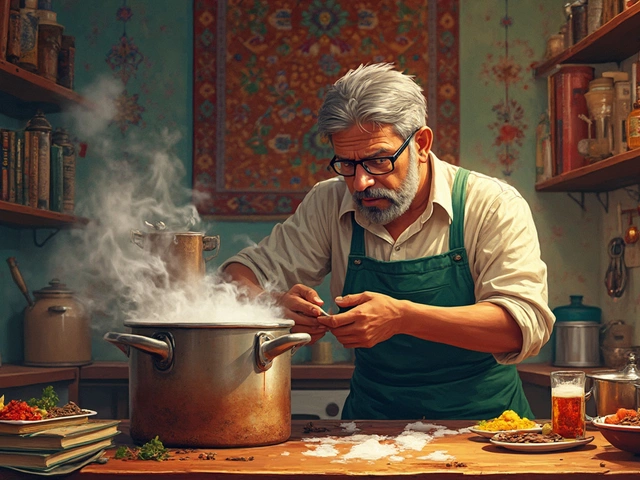
Let's talk about a classic rivalry – tea and coffee. They both occupy a special place on our tables and in our hearts. But if you ask tea lovers, they'll tell you tea is coffee's biggest challenger. Why is that?
The flavors of tea and coffee are worlds apart, largely because of their origins. While coffee beans undergo roasting to bring out a bold flavor, tea leaves offer a spectrum of tastes depending on where they're grown and how they're processed. Ever tried comparing Earl Grey's citrusy notes with the earthy depth of a flat white? You'd think they're siblings from different planets.
But it's not just about taste. How we consume these drinks can be just as telling. Many people thrive on coffee's caffeine jolt first thing in the morning. Yet, the leisurely nature of brewing tea makes it perfect for moments of contemplation or unwinding. It's a ritual, a pause button for life's chaos.
- Flavor Profiles: A Tale of Two Brews
- Rituals and Consumption
- Health Benefits: Tea vs Coffee
- Why Tea Enthusiasts Favor Tea
Flavor Profiles: A Tale of Two Brews
When we talk about coffee and tea tasting, the conversation naturally begins with their distinct flavor profiles. Coffee's bold robustness comes from roasting the beans, a process that brings out rich, deep flavors. On the other hand, tea is more like a chameleon – it can be anything from light and floral to dark and smoky.
Tea's diversity stems from how it's processed. Green tea, for example, is not oxidized and offers a fresh, almost grassy taste, while black tea is fully oxidized, resulting in a stronger, more robust flavor. Oolong tea falls somewhere in the middle, providing a complex taste that evolves with every sip.
"Both coffee and tea have nuanced flavors that can be unlocked through different brewing methods and by recognizing the unique characteristics of each variety." - Jane Doe, Tea Sommelier
Comparing these flavors is like comparing apples and oranges, but for those intrigued by what makes a beverage memorable, it's worthwhile. Many tea enthusiasts describe tea tasting as an exploration – every type tells a different story.
Coffee typically offers a consistent hit of powerful flavors, often described as nutty, chocolaty, or even fruity. Depending on where the beans are from, you can pick out subtle hints like blueberry or citrus in some varieties.
Breaking It Down: Tea Tasting Notes
- Green Tea: Often vegetal or grassy, with sweetness or nutty notes.
- Black Tea: Bold and full-bodied, with malty or fruity undertones.
- Oolong Tea: Ranges from floral to toasty, offering a unique complexity.
- White Tea: Delicate and light, with hints of flowers or hay.
For the intrepid flavor seeker, tea provides endless opportunities for discovery. The subtleties within cups mean there's always something new to experience. Perhaps that's why some staunch tea drinkers often say, once you dive into the world of teas, there’s no going back.
Rituals and Consumption
When it comes to drinking coffee and tea, how you do it can be as important as what you’re drinking. Both coffee and tea have their own set of rituals and habits that have evolved over time.
First, let's look at coffee. For many people, coffee is a morning staple that jolts them awake with its strong caffeine kick. The habit of purchasing a steaming cup on the go is almost as ingrained as brushing your teeth. From the classic espresso shot at a corner cafe to a meticulously crafted latte at a hipster coffee shop, coffee culture emphasizes speed and efficiency.
Tea: A Ritual of Calm
Now, on the other hand, we have the ritual of tea drinking. It often involves a slower pace, with an emphasis on warmth and relaxation. While tea bags are convenient, making a cup from loose leaves is about savoring the moment. Different cultures have elevated tea brewing into an art form. Think British afternoon tea with its delicate finger sandwiches, or the meditative Japanese tea ceremony, both emphasizing tea as an experience, not a quick fix.
Interestingly, while most Americans might see coffee as an all-day affair, Brits often have a cuppa several times throughout the day. This ritual involves not just the drink itself, but also a break from the busyness of life.
A Global Look
Global data suggests that tea and coffee consumption varies widely. Here's a snapshot of how people might start their day around the world:
| Country | Most Common Morning Beverage |
|---|---|
| United States | Coffee |
| China | Green Tea |
| Australia | Flat White |
| India | Masala Chai |
Each drink says something about the culture that enjoys it. While a cup of joe might symbolize the hustle and bustle, a slowly brewed tea can offer a peaceful reprieve, a small yet significant act of self-care. Just imagine settling down with a warm mug in hand, watching the steam curl upwards—a simple pleasure, but a potent one.

Health Benefits: Tea vs Coffee
Let's dive into why both tea tasting and coffee lovers swear by their favorite drinks when it comes to health. Sure, both bring something unique to the table, but let’s break it down to see what you might be sipping on in terms of wellness.
Antioxidants Galore
Starting with tea, it's full of antioxidants. Green tea, for instance, is rich in catechins, which are believed to fight cell damage. Black tea contains theaflavins and thearubigins, also powerful antioxidants.
Coffee, though not often praised for the same thing, also doesn't fall short. It boasts chlorogenic acid, a type of antioxidant that's said to help reduce inflammation. So, both brews offer a healthy dose of these beneficial compounds.
Caffeine Content
Now, caffeine is a big player here. Coffee is notorious for a higher caffeine punch, typically 80-100 mg per cup, which is why your morning brew gets you going.
Tea, on the flip side, has lower caffeine levels, varying from about 20-60 mg per cup. If you're caffeine-sensitive, drinking tea can provide a gentler energy boost.
Potential Health Perks
Research suggests both drinks may have perks beyond waking you up. Tea, especially green, is often associated with improved brain function and heart health.
Studies also propose coffee could have benefits. It's linked to lower risks of certain diseases like Parkinson's and might help enhance cognitive function.
For those who like numbers, here's a little overview:
| Beverage | Average Caffeine (mg) | Antioxidant Type |
|---|---|---|
| Coffee | 95 mg | Chlorogenic acid |
| Green Tea | 35 mg | Catechins |
| Black Tea | 45 mg | Theaflavins |
What's Right for You?
At the end of the day, your choice might just come down to preference. Both have their loyal fans for a reason, each holding its own unique set of health benefits.
As you relish that next cup, whether it’s a delicate tea infusion or a robust coffee brew, know you’re treating yourself to more than just a tasty beverage.
Why Tea Enthusiasts Favor Tea
When it comes to picking a favorite beverage, many tea lovers swear by tea over coffee. What's behind this preference? It's not just the rich variety of flavors that attract people. There's a whole lifestyle attached to drinking tea that tea tasting devotees adore.
The Wide Range of Flavors
Tea offers a diverse palette of flavors that can satisfy different taste preferences. Whether you're into the floral aroma of jasmine, the brisk astringency of black tea, or the umami richness of matcha, there's likely a tea out there that you'll love. Unlike coffee's straightforward profile, tea provides a journey of discovery with each sip.
A Gentler Caffeine Hit
While many people reach for coffee for a morning jolt, tea promises a more moderate and prolonged caffeine release. This often results in fewer jitters and a smoother energy boost. Many enthusiasts appreciate this gentler lift, especially throughout the day.
The Ritual and Culture
There's something about the tea-making process itself. The act of brewing tea is calming and meditative, unlike the hurried process that often accompanies coffee brewing. Preparing tea can be a mindful ritual that offers a break from the hustle of daily life.
Health Benefits
Tea is often linked to several health benefits. Whether it's the antioxidants in green tea or the calming properties of chamomile, sipping on the right brew can be a health-conscious choice. Some studies even suggest tea drinkers might have a lower risk of heart disease and cancer, although keeping a balanced diet is key.
The Social Aspect
Tea has a strong social angle, too. The concept of afternoon tea, complete with tiny sandwiches and pastries, brings people together for a delightful experience. This isn't just about drinking; it's about connection, sharing, and creating memories.





Categories